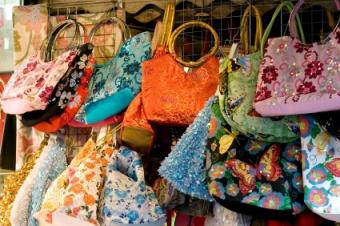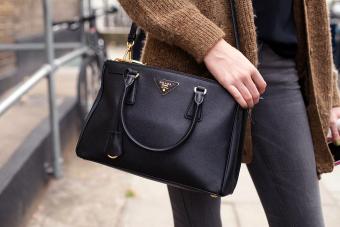
In the United States, selling fake bags is illegal under the federal trademark law, also known as the Lanham Act. Counterfeiting handbags also violates the Stop Counterfeiting in Manufactured Goods Act, which Congress passed in 2006.
Lanham Act
The Lanham Act is the primary federal trademark law in the U.S. It prohibits trademark dilution and trademark infringement. Trademarks are names, phrases, designs, or marks that identify the source and manufacturers of products. Each state also has its own trademark laws, as do most countries outside of the United States. Infringements are based on the "likelihood of confusion" standard.
Congress passed the Lanham Act in 1946. It has been amended several times, and the passing of the Trademark Counterfeiting Act of 1984 significantly strengthened enforcement by allowing seizures and significant financial judgments against counterfeiters.
Over time the courts have held that the law holds in territories outside the U.S., as long as at least two of the following standards have been met:
- The conduct of the defendant must have a substantial effect on United States commerce.
- The defendant must be a United States citizen.
- There must be an absence of conflict with foreign law.
Stop Counterfeiting in Manufactured Goods Act
The 2006 law, Stop Counterfeiting in Manufactured Goods Act, amended the federal criminal code with some important updates. The prohibition against counterfeit goods now also includes trafficking in labels or similar packaging when you know a counterfeit mark is applied in a way that will confuse, deceive, or cause mistaken understanding. The definition of a counterfeit mark is also broadened.
Items that authorities deem counterfeits are subject to forfeiture, as are any tools or supplies used to create the counterfeit labels. The deceptive articles will be destroyed and restitution will be ordered by the court.
Knockoffs vs. Counterfeits
Designs are not protected by copyright law, although designers continue to lobby Congress to change this. Since it is not illegal to copy the overall design of a handbag, if you purchased a bag that is merely shaped like the famed Hermes Birkin bag you are not necessarily carrying an illegal fake. It may simply be a clever knockoff.
However, if you are carrying a bag with a Louis Vuitton LV logo or if Hermes is engraved on the zipper, and you paid much less than market price, it is most likely counterfeit.
Detecting Counterfeits
All logos and signifying details found on handbags must be authentic, and if they are not, the seller who sold you the bag has violated the law against selling fake bags by selling counterfeit goods. The market for fakes has gotten so big, and sellers have become so knowledgeable, that counterfeit handbags are often hard to recognize unless you are an expert.
Since it is illegal, however, sellers and manufacturers of counterfeit handbags have many tricks to get their products past customs and fool buyers, such as:
- Sellers may purchase a knockoff and add a piece of fake hardware with a name, symbol or logo.
- Logos may be stamped on bags.
- Labels may be sewn inside bags.
- Sellers may add a peel-away piece that changes, for example, the interlocking 'CC' on a Chanel bag to an 'OC.'
There are other ways to spot fakes. The most obvious way to recognize a fake is to know the origin. Any 'great' deal found in places like Canal Street in New York or Santee Alley in Los Angeles is a result of fakery. The best way to avoid purchasing counterfeit goods is to buy them from licensed sellers and resellers like Portero, a luxury auction site that takes great pains to authenticate its handbags.
Criminal Enterprise Involvement
Many people think that purchasing fake handbags is fine. Breaking the law is justified with claims like 'sellers are just giving people what they want,' and 'besides, the luxury companies have plenty of money so they aren't really being hurt.'
However, this activity is far from innocent. Most counterfeit goods are produced for organized crime syndicates by workers who suffer in inhumane conditions. Buyers who purchase these counterfeit bags are giving money to criminal organizations that may also deal in things such as child prostitution and human trafficking. Profits from the sale of these handbags may also be traced to terrorist activity.
Nonetheless, in the U.S., the law against selling fake bags does not come with heavy criminal penalties. In New York, for example, trademark counterfeiting is a class C felony, the same category as car theft. Some of the largest counterfeit raids, however, have seized tens of millions of dollars worth of goods.
Companies have also been fighting back by securing large civil judgments against organized crime networks. They can then file seizure orders against criminals' houses, cars and bank accounts. In some cases these counterfeit operations involve billions of dollars and have been going on for decades.
Am I Violating the Law?
If you are only buying the answer is no, but if you resell, perhaps. Many luxury goods companies complain that the U.S. isn't as serious about eliminating counterfeit goods as it should be. In France, for example, tourists caught bringing in counterfeit goods can receive massive fines.
Resellers can have stiff consequences if found selling counterfeits. In June of 2008, LVMH, the owner of various luxury brands including Louis Vuitton, won a judgment in France ordering eBay to pay 38.6 million euros ($61 million) in damages for failing to police its site. They were able to prove that ninety percent of all Louis Vuitton and Dior items sold on the site are counterfeit.
Everyday consumers should also beware of designer "purse parties" - even though they may be organized by PTAs, churches, or that attractive neighbor down the street. These bags might still counterfeit and the sellers subject to prosecution. Even places like Walmart and Costco have sold counterfeit bags and been held liable for willful blindness because they failed to confirm the origin of the goods they purchased.
Maintain Fashion Integrity
Fake designer handbags may seem like a good deal, but the ethical and practical implications of such shoddy merchandise rapidly devalue even the best bargain. By knowing how to examine different features and details for quality, it is possible to quickly spot a counterfeit bag and help maintain the integrity of your fashion sense. An exquisitely designed high-quality handbag is like a work of art and should be cherished and enjoyed, as long as it is legal.







